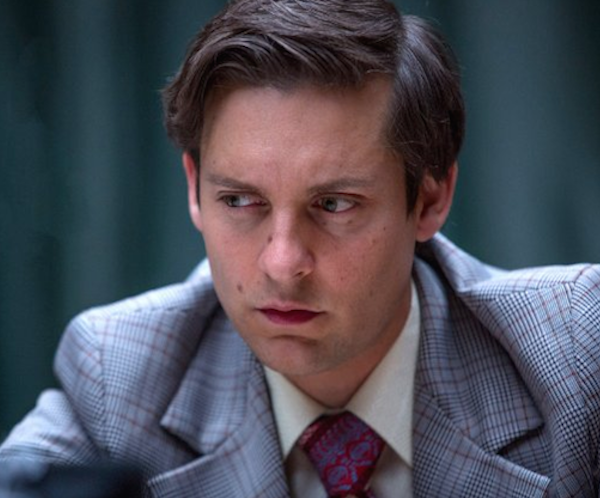Fuse Commentary: “Pawn Sacrifice” — Missing Bobby Fischer
I wish I had more thumbs to turn down about Pawn Sacrifice.

Toby Maguire as Bobby Fischer in “Pawn Sacrifice.”
By Harvey Blume
Until he dropped out to dedicate himself fully to chess, Bobby Fischer attended Brooklyn’s Erasmus High School with Barbara Streisand, who thought he was “cute.” It turns out that he had a more long-lasting connection with another singer, Patti Smith, as recounted in Patti Smith, Survivor:
Ms. Smith [found] an opportunity to photograph the chess table used by Bobby Fischer and Boris Spassky in 1972; it was in a basement in Reykjavik, Iceland. . . though her interest in chess is purely aesthetic, she writes, and her expertise nonexistent. Afterward, she finds herself in a midnight meeting with Fischer himself, deflecting his paranoid ravings by singing Buddy Holly songs at full throttle until just before dawn.
This collision with Fischer in 2007 had a peculiar aftermath. “I had met him before,” she said. “When I was a young girl at Scribner’s in the late ’60s, I had the game department. He was supposed to do a book signing, and I stacked up all the books, and a lot of people came. He appeared very nervous, and he was only a couple of years older than me. He couldn’t handle it, and I had to sneak him out the back door.”
In Reykjavik, she said, she told him of their long-ago encounter, not that he remembered. “I told him how we’d met before, and he said, ‘Can you still order books?’ ” As it happens, Ms. Smith, being a bibliophile, has a network of rare-book contacts, and she promised to help him out. “If a book can be found, I can find it,” she said. And so it was that for a time before Fischer’s death in 2008, Ms. Smith was his go-to for obscure history books.
I’d dearly love to know what obscure history books Fischer wanted Patti Smith to procure for him.
***
There’s no mention of Fischer’s passion for history in Pawn Sacrifice, the Bobby Fischer biopic starring Tobey Maguire. I wish I had more thumbs to turn down about this movie. Maguire, of Spiderman fame, doesn’t have a clue about the character he’s portraying in this movie. Web-slinging is easy compared to being Fischer.
Fischer is so much darker, more brilliant, and more dangerous.
Just check out the above Youtube clip of Fischer being interviewed by Dick Cavett in 1971. Fischer is uncomfortable, verging on inarticulate. Cavett has to verbally jab him for responses. You get the sense that minus these stimuli Fischer would subside into catatonic hostility. He never liked cameras, almost bolted from his ’72 match with Spassky because he was disturbed by them — even by the thought of them; they could drive him crazy even when they weren’t on.
Fischer didn’t like audiences, either, at least not the living, breathing kind. In this he resembles another savant, Glen Gould, who withdrew from live performance to perfect his craft with the aid of technology and behind technological barriers. Of course, Fischer couldn’t quite do that. He wasn’t playing Bach; he was playing the likes of Spassky.
When Fischer delivers to Cavett the famous line that his whole point in chess is to crush an opponent’s ego, he laughs, but it’s not a suave laugh, hardly flip. It’s mean, a killer’s laugh, the crude intent disguised a bit for national television by an embarrassed Brooklynese guffaw.
Pawn Sacrifice dubs Maguire into the Cavett interview. Why? You get more of Fischer in that interchange than you come close to in this tinny movie.
Fischer will be meat for many portrayals to come, what with his peculiar rise and fall, his special transcendence and defeat. His is a particular variation of the hero’s journey: this kid from Brooklyn defeats the best — the geopolitical best — his sport can offer, then proceeds to tear himself to pieces.
For a filmic portrayal of Bobby Fischer, see Liz Garbus’s excellent documentary, Bobby Fischer Against the World. Or, if you know the nuts and bolts of the game, go over game six of Fischer’s win against Spassky. The movie makes much of this, and much is to be made of it. At the end of that game, as in real life, Spassky rises up to applaud his opponent. He’s applauding being throttled, asphyxiated, crushed. Some say Spassky lost to Fischer in Reykjavik because all of Fischer’s obstreperous demands during their championship match threw the Soviet champ off balance. I don’t think so. I think game six convinced Spassky that move by move, game by game, he could never beat Fischer. Nor could anyone else.
Only Fischer could beat Fischer, which is what he set about doing to perfection in the years remaining to him after beating Spassky.
Harvey Blume is an author — Ota Benga: The Pygmy At The Zoo — who has published essays, reviews, and interviews widely, in The New York Times, Boston Globe, Agni, The American Prospect, and The Forward, among other venues. His blog in progress, which will archive that material and be a platform for new, is here. He contributes regularly to The Arts Fuse and wants to help it continue to grow into a critical voice to be reckoned with.
